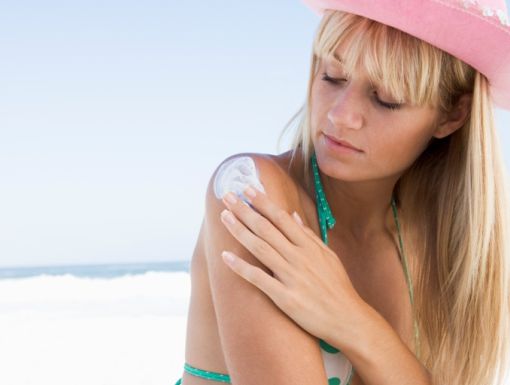
Baby, It’s Hot! Sunscreen and Infants
As summer heats up, everyone is more conscientious about wearing sunscreen and the appropriate protective gear. Parent of infants are always curious about what to do about sun exposure for their little ones. Here are some basic guidelines we recommend when it comes to sun protection and babies under 6 months old:
- Avoid Direct Sunlight: The American Academy of Pediatrics and the American Cancer Society encourage parents to avoid direct sunlight, particularly from 10:00 a.m. till 2:00 p.m. when UVA and UVB rays are most intense and damaging, for all infants under 6 months of age
- No Sunscreen Under 6 Months: Infants less than 6 months old are more vulnerable to sun damage than older children because of their markedly increased surface-area to body-weight ratio. This intensifies the exposure to the active chemicals in sunscreens.
- Wear Appropriate Protective Clothing and Gear: If it’s unavoidable that an infant will be in the sun, make it brief and dress them in protective clothing including a wide brimmed hat which covers their ears and neck, sunglasses and loose-fitting, cotton, light-colored, tightly weaved, long sleeve and pant clothing.
- SPF 30 or Higher- Test the Product First: If sunlight is unavoidable, speak to your pediatrician about which sunscreen products to use. In general, choose children's products SPF 30 or greater, unscented and made for sensitive skin. Test the product by rubbing a small amount on the baby’s wrist to determine if a rash appears. Follow instructions for reapplication of the product.
- Avoid DEET: Always avoid combined sunscreen/insect repellants as exposure to the insecticide DEET can result in neurologic harm to very small babies.
- Vitamin D Intake: Some parents believe sun exposure is essential to infants in order for them to have adequate amounts of Vitamin D. This is not the case in formula fed babies as these nutritional products are fortified with Vitamin D. It is recommended that all breastfed babies receive supplemental Vitamin D daily to make certain they too have adequate levels.
- Look for Signs of Dehydration: Be wary of dehydration caused by the heat characterized by less tears, red skin, sticky mouth secretions and decreased urine output. Plan to provide extra breast milk or formula if your baby seems dehydrated. In addition, be aware that young infants create less sweat, which is the body's primary mechanism of cooling down. Placing babies to lie down in the sun puts them at a higher risk of heat stroke, a potentially life-threatening condition.
If you must use a sunscreen on your baby, choose a mineral (not a chemical) preparation. Look for zinc oxide or titanium dioxide as the active ingredients.
If you have any other questions about what do to for your baby when it comes to sun protection, contact your pediatrician.
Book an appointment with a pediatrician here.



